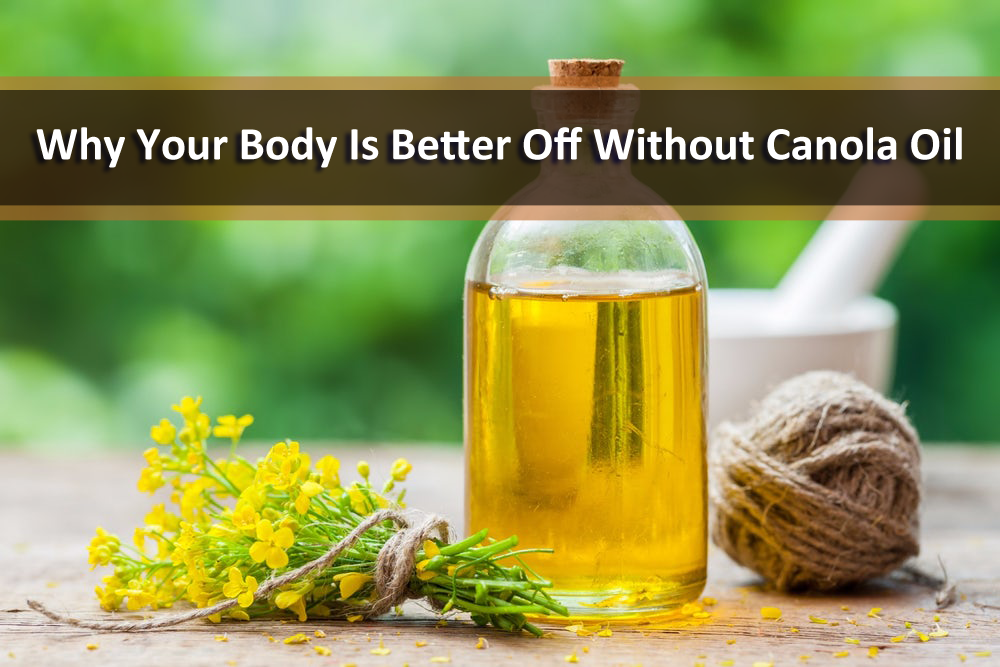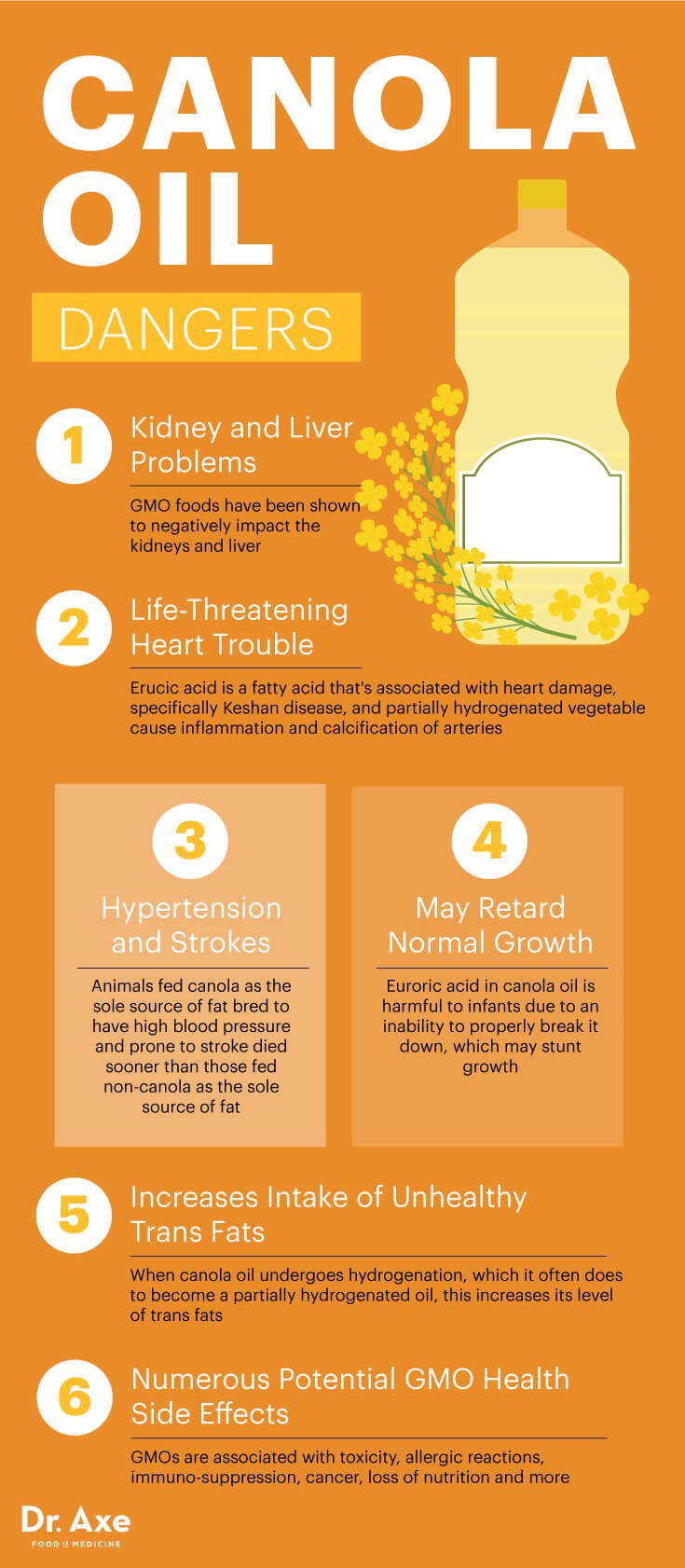Why your body is better off without Canola Oil

You have probably heard us talk about the importance of consuming healthy fats and healthy oils—healthy oils being olive oil, avocado oil, coconut oil, almond oil, to name a handful—but we haven’t talked much about the negative consequences of consuming less healthy oils. Like the evil canola oil.
Health tip of the day: Go ditch that giant bottle of poisonous vegetable oil that has been lingering in your pantry for years! Because, quite literally, canola oil has fundamental elements that are poisonous to humans.
Have you ever thought about where canola oil comes from? It doesn’t come from canola. In fact, canola isn’t even a thing. When it first because popular in the years following WWII, canola oil was called LEAR, which stood for low-erucic acid rapeseed. Considering erucic acid is poisonous and rapeseed doesn’t exactly sound appealing, the name was soon changed to canola oil, basically for marketing purposes.
Seems like it was probably a good idea. Who wants to consume something called erucic acid rapeseed?
But that is what canola oil is: It comes from the rapeseeds of a rape plant, which contain erucic acid, and erucic acid is NOT something we want to be eating. In rodents, erucic acid has shown to produce fatty deposits in the heart, the muscle, and the adrenals and impair their growth. You can read more about erucic acid here: (https://www.sciencedirect.com/topics/biochemistry-genetics-and-molecular-biology/erucic-acid).
As canola oil became more and more popular, people started to fear the erucic acid component of it. This led to plant and canola oil producers initiating programs to reduce the levels of erucic acid in rapeseed oil. By 1974 in Canada, 95 percent of rapeseed oil was considered “low-erucic acid,” and therefore deemed safe for human consumption (this means it allegedly contains less than 2 percent erucic acid).
Though less than 2 percent might be considered safe, or at least it won’t kill you, let me ask you this: Why would you want to consume oil with even 2 percent poison? Why wouldn’t you aim to consume healthier oils with 0 percent poison?
OK, erucic acid aside….
Another reason canola oil should be avoided is that it’s generally quite processed. By 2005, 87 percent of canola oil in the U.S. was found to be genetically modified, and by 2009, 90 percent of Canadian canola oil was genetically engineered.
The process of making canola oil—a refined oil—means it goes through a procedure of bleaching and degumming at high temperatures and with the help of chemicals. And because Canola oil is high in Omega-3 fatty acids, it’s susceptible to becoming rancid and smelly, so it also has to be deodorized before it can go to market. This process involves actually removing some of the Omega-3 fat acids and turning them into trans fatty acids.
Even though we’re led to believe that the trans fat content in canola oil is less than 0.2 percent, research done at the University of Florida discovered some canola oil has trans fat levels as high as 3.6 percent. Meanwhile, another study published in the Journal of Food Lipids discovered trans fat levels in various canola oils were between 0.56% and 4.2%. Of course, these levels aren’t listed on the label. (https://onlinelibrary.wiley.com/doi/abs/10.1111/j.1745-4522.1994.tb00244.x)
All of this means health consequences to you. Two commonly believed dangers of canola oil include:
GMOs: Bad for the kidneys and liver…and all sorts of other things
Check out this 2011 study published in Environmental Sciences Europe for more about the health consequences on your kidneys and liver from consuming GMOs: (https://link.springer.com/article/10.1186/2190-4715-23-10).
Other known side effects of consuming GMOs include an increased chance of cancer, antibiotic resistance, allergic reactions, and a suppressed immune system. Read more here: (http://www.centerforfoodsafety.org/issues/311/ge-foods/ge-food-and-your-health#)
Hydrogenation: Bad for the heart
Partial hydrogenation, as is the case with canola oil, has been linked to inflammation and calcification of the arteries, which are two known dangers linked to developing heart problems.
Further, when the oil goes through the hydrogenation process, it often increases the levels of trans fats, which are known to increase your bad cholesterol (LDL) and decrease your good cholesterol (HDL), which is also bad for the whole developing heart disease thing.
Finally, for what it’s worth, animal studies have shown links between canola oil and strokes, as well as to high blood pressure (https://link.springer.com/article/10.1007%2Fs11745-000-539-5#page-1).
So…go do it if you haven’t already: Ditch the canola oil and replace it with the likes of olive oil, coconut oil, avocado oil or almond oil…

4. May Retard Normal Growth
Up until recently, it was not legal to use canola oil in infant formulate. There have been what I think are valid concerns about canola oil retarding growth in children. Specifically, the euroric acid in canola oil is harmful to infants due to an inability to properly break it down. The FDA previously made the use of canola oil illegal in baby formula. However, as of a few years ago, canola oil made it to the generally recognized as safe list. (http://www.westonaprice.org/childrens-health/the-scandal-of-infant-formula/)
Not only is it highly concerning to feed developing infants a GMO oil, but it’s also highly questionable to give them unhealthy fats. Proponents brag about canola’s overall healthy fat profile, but I don’t buy it. Now it’s being sold in the form of a baby’s first meal. Of course, I highly encourage skipping the commercial formulas and opting for breastfeeding or, if necessary, homemade baby formula.
5. Increases Intake of Unhealthy Trans Fats
According to a study published in the Journal of Food Lipids, when soybean and canola oils purchased in the U.S. were evaluated, “The trans contents were between 0.56% and 4.2% of the total fatty acids.” (http://onlinelibrary.wiley.com/doi/10.1111/j.1745-4522.1994.tb00244.x/abstract)
When canola oil undergoes hydrogenation, which it often does to become a partially hydrogenated oil, this increases its level of trans fats. These are a group of fats you want to avoid as much as possible since they’re scientifically known to increase LDL cholesterol and lower HDL cholesterol.
When you read “partially hydrogenated oil” on any food label, that guarantees there is some amount of trans fat present. This is true even when the label tells you that there is zero trans fat. How can that be? Well, if a serving contains less than 0.5 grams, the company is allowed to indicate there are no trans fats. Frustrating, I know. (http://www.berkeleywellness.com/healthy-eating/food/article/hydrogenated-oils)
Trans fatty acids are hazardous byproducts of food processing and are truly health destroyers. In fact, if you decide to get rid of your canola oil, I would also stop cooking with these oils as well: corn oil, safflower oil, soy oil and vegetable oil.
6. Numerous Potential GMO Health Side Effects
I already mentioned the link between GMOs and negative liver and kidney implications, but it doesn’t stop there. According to the Center for Food Safety, there are several new and very serious health concerns and unexpected effects of genetic engineering un-earthed by scientific research: (http://www.centerforfoodsafety.org/issues/311/ge-foods/ge-food-and-your-health%23)
- Toxicity
- Allergic reactions
- Immuno-suppression
- Cancer
- Loss of nutrition
What to Substitute for Canola Oil
So, what are the best oils for cooking? Here are the top oils I personally use as a substitute for canola oil:
1. Coconut Oil
Coconut oil is best when it’s cold-pressed and virgin. Do NOT buy refined coconut oil. Your coconut oil should smell like you’re on a beach in the Caribbean. It has a high heat threshold and contains medium-chain fatty acids that can support both fat loss and your nervous system.
2. Olive Oil
People often compare canola oil to olive oil. Olive oil wins every day of the week!
I don’t recommend it as the first option for cooking, but olive oil benefits are tremendous and at the heart of the Mediterranean diet. Look for an organic extra-virgin or cold-pressed olive oil that’s available in a darkly colored glass container. Many inferior, fake olive oils are mixed with cheaper, GMO vegetables oils so make sure it’s GMO-free. Olive oil is great in homemade salad dressings and for drizzling on finished products like cooked vegetables.
3. Ghee or Organic, Pasture-Raised Butter
Both butter and ghee benefits come from alpha lipoic acid and conjugated linoleic acid, which can promote weight loss. Also, they contain healthy short chain fatty acids and have a higher heat threshold. When buying butter, stick with organic grass-fed varieties.
4. Red Palm Oil
Red palm oil is made from the palm fruit instead of the palm kernel, and in its unrefined state, it’s high in vitamin E and beta-carotene. It’s also stable under high heat and great for cooking. Make sure when buying palm oil that it’s certified sustainable.
If for some reason you must buy canola oil, make sure that it’s organic because then it at least can’t be from genetically modified plants. It’s still illegal to use genetic engineering or modification in certified organic products. (http://blogs.usda.gov/2013/05/17/organic-101-can-gmos-be-used-in-organic-products/)





